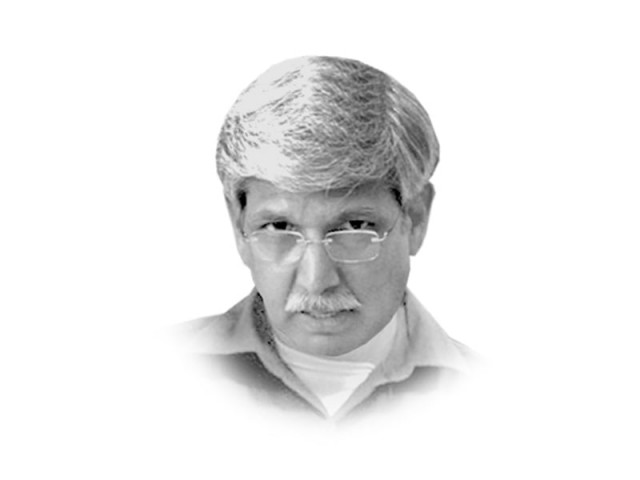Analysing the internal attacks on the military
Those who questioned military belonged to what in Pakistan is called ‘liberalists club’, engineered hype against...

Those who questioned the military’s double-play belonged to what in Pakistan is called the ‘liberalists club’. They found a veritable partner in the US in engineering a hype of mal-intent against Pakistan’s military establishment, which was painted as allegedly cavorting with the Taliban despite participating in the war on terror as America’s ally. There were, however, bigger objectives at play at the domestic plane. The return of a democratic government following General (retd) Pervez Musharraf’s stint at the helm seemed tentative. Benazir Bhutto’s untimely demise had laid open the institution of a relatively green and weak coalition at the helm. The rise of Asif Ali Zardari, as president, with his shady past, meant that democracy may remain suspect under a strong military establishment and not sustain. It, therefore, needed to be supported from the outside.
Two parallel factors came into play: one, latent anti-army sentiment among the literati of a particular kind, non-vernacular, gradually began to play up an anti-military stance. The explosion of electronic media and a turnaround in the character of the print media enabled a platform to these individuals who slowly coalesced into a uniform voice bringing into question everything related to the military and its omissions and commissions. The aim was simply to subjugate the army, to break its will and cause it to second-guess itself on its role and alleged excesses whether those related to sponsoring terrorism as a policy, Balochistan, or something as remote in time as its role in the former East Pakistan, now Bangladesh. The army’s past record of usurping the right to rule from the politicians was especially brought to the fore in a widespread discourse.
Sometimes this pressure was relentless when there were weak moments in the military’s conduct as in Abbottabad, and sometimes simply frustrating when the military stood confounded against a barrage coming from its own countrymen, its traditional bastion of support and moral succour especially when it was fully extended in its deployments in the ongoing war against terrorist groups. The military was being hit at its vitals, as strategists like to explain an offensive by an adversary. There were allegations of money being fed by external sources to some individuals, as well as some media houses, to keep the onslaught going, but these largely remained unsubstantiated. There certainly was an outside interest to see the Pakistani military belittled, but there existed within the liberalists as well an equal urge to see the military cut to size regardless of its occupation in fighting a threat that was labelled existential.
When a chink presented itself, there was help available to force the army to retreat from its traditional position of strength in the national, cultural, social or ideological arenas — all places where the military had retained a focal position through the decades. The US, in its effort to help civil primacy over the military, added two clauses to its planned bill of aid to Pakistan that practically seemed dictating obedience to the civilian government. Some claimed it was the handiwork of a useful Pakistan hand in Washington as he sought to malign the Pakistani army with restraining clauses through legal binds. The fact that such an attempt came through co-opting a foreign nation on behalf of the political set-up at home left its own debris in its aftermath.
By some counts, General Ashfaq Parvez Kayani’s personal proclivity to see a democratic set-up sustain and succeed prompted an overdose of self-righteous moral high ground by those whose singular focus remained to malign the army into submission, disregarding any concerns for disabling an important institution of the state. Through all this, somehow, the military made through till its next challenge.
That came soon after. Just as the Supreme Court was struggling through its own tribulations of credibility at the highest level, it delivered a verdict on a 16-year-old case against a former army chief and a director general of the ISI. That opened the floodgates for another round of a renewed attempt to bring the army down, based on an indictment of two former generals by the highest court. Two other cases against six other generals by different agencies added further spite to the coterie of voices that found another opportunity to debilitate the military. The army chief had to give a statement to those indulging in rabid verbiage to separate the institution from the act of an individual. There was a derived sense in army chief’s statement asking all, including the Supreme Court and a supercharged media, to desist from damaging the institution by calling into question the fidelity of some of its ongoing operations.
There continue to be institutions in the country that nurture hate against the military. They remain as extreme in their manner of discourse as any extreme religious school of thinking. If, on one hand, slitting throats of those who disagree with their thought is kosher, on the other, we see a ferocity to rail against the military with abuse and innuendo. The majority that is centrist continues to be squeezed under the two extremes, both of which are hopelessly intolerant.
If it seems like an obituary to a system or an ode to what could have been, that is precisely how close we stand today in our national make-up to undoing what has been so painstakingly achieved through an especially cohesive effort. The choice to progress or regress from where we are is entirely ours. Flagging red to a bull has never paid dividends; it could, however, make for a grand spectacle
Correction: The word 'analysing' was misspelt in the headline. the error is regretted.
Published in The Express Tribune, November 21st, 2012.















COMMENTS
Comments are moderated and generally will be posted if they are on-topic and not abusive.
For more information, please see our Comments FAQ